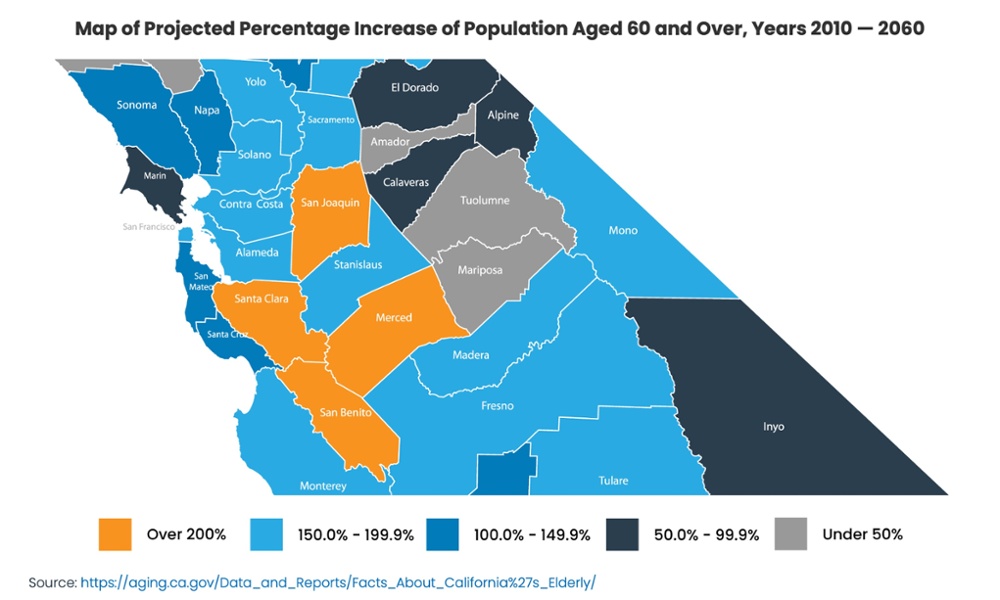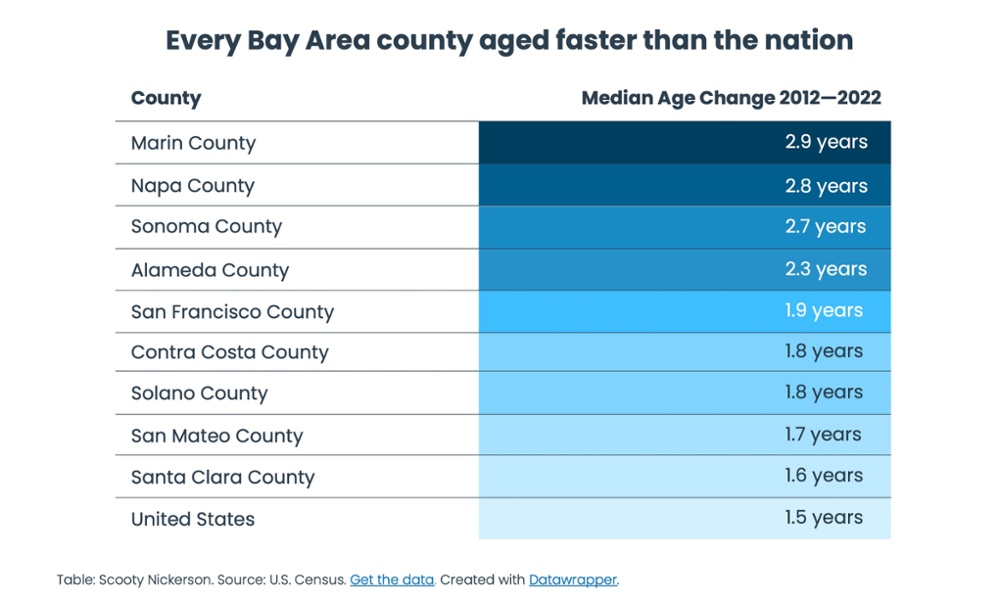The number of people over 60 years old in Santa Clara County, comprising most of Silicon Valley, is expected to grow by more than 200 percent from 2010 to 2060, according to data compiled by the California Department of Aging. The county’s 80-and-over cohort will grow even faster over that same period — more than 600 percent.
Yet it isn't only Silicon Valley; every Bay Area county is aging faster than the United States, The Mercury News recently reported. The Bay Area grayed rapidly over the last decade, as the below chart done by the newspaper shows.
That California even has a “Department of Aging” tells you about the scope of the challenge and the seriousness with which it is being treated by the state’s elected officials. One of the most important issues that will have to be addressed is housing. While some people will be able to age in place, many will need the kind of specialized services that can only be delivered in a senior living facility.
Recognizing this growing need, we are working on what will be the first significant senior living project in Downtown San Jose in decades, Gifford Place. Once complete, it will provide 169 dedicated senior living apartments in a mix of studios and one- and two-bedrooms, including assisted living and memory care units.

A rendering of the six-story Gifford Place, located at the northeast corner of West San Carlos and Josefa streets.
As with all real estate, location matters with senior housing. We think that being downtown will especially appeal to residents who want to maintain an active lifestyle and remain involved in the community, such as Baby Boomers, 10,000 of whom turn 65 every day.

A rendering of one of Gifford Place's dining areas with Downtown San Jose's skyline in the background.
In its most recent report, published in May, the National Investment Center for Seniors Housing & Care (NIC) found that San Jose’s stabilized occupancy rate for majority-assisted living properties was 80.9 percent, 10.9 percentage points below pre-pandemic levels — the largest gap across 31 primary U.S. markets the center tracks. San Jose’s year-over-year inventory growth for this property type declined 0.9 percent from May 2022 to April, the center found, meaning the city’s majority-assisted living unit stock has dropped slightly below year-earlier levels.
However, the market for senior housing properties nationwide remains intensely competitive, particularly those that have recently opened and are still in the lease-up phase, the report said. That’s one reason why we remain bullish on Gifford Place’s prospects, and the report provided another: These newly opened projects are taking a share of the market from stabilized properties, despite higher asking rates in general, according to the NIC.
The Gray Wave is a demographic certainty, and it's washing up on the shores of Santa Clara County and California. The wave's impact will be felt over decades, but we have to start now to get ready. Housing will be a big part of addressing the needs of an aging population, and this demand is creating an opportunity for investors. Gifford Place is early out of the gate, with a great location and other amenities that we think make it especially compelling both as a place to live and as an investment.

Gifford Place's residents walk through a landscaped courtyard to travel from one end of the senior living complex to the other.
Contact us today if you want to learn more about how to invest in Gifford, part of our Opportunity Zone Fund II portfolio.
Important Disclosures
The contents of this communication: (i) do not constitute an offer of securities or a solicitation of an offer to buy securities, (ii) offers can be made only by the confidential Private Placement Memorandum (the “PPM”) which is available upon request, (iii) do not and cannot replace the PPM and is qualified in its entirety by the PPM, and (iv) may not be relied upon in making an investment decision related to any investment offering by an issuer, or any affiliate, or partner thereof ("Issuer").
All potential investors must read the PPM and no person may invest without acknowledging receipt and complete review of the PPM.
With respect to any performance levels outlined herein, these do not constitute a promise of performance, nor is there any assurance that the investment objectives of any program will be attained. All investments carry the risk of loss of some or all of the principal invested. Assumptions are more fully outlined in the Offering Documents/ PPM for the respective offering. Consult the PPM for investment conditions, risk factors, minimum requirements, fees and expenses and other pertinent information with respect to any investment.
These investment opportunities have not been registered under the Securities Act of 1933 and are being offered pursuant to an exemption therefrom and from applicable state securities laws. All offerings are intended only for accredited investors unless otherwise specified.
Past performance are no guarantee of future results. All information is subject to change. You should always consult a tax professional prior to investing. Investment offerings and investment decisions may only be made on the basis of a confidential private placement memorandum issued by Issuer, or one of its partner/issuers. Issuer does not warrant the accuracy or completeness of the information contained herein. Thank you for your cooperation.
Real Estate Risk Disclosure:
- There is no guarantee that any strategy will be successful or achieve investment objectives including, among other things, profits, distributions, tax benefits, exit strategy, etc.;
- Potential for property value loss – All real estate investments have the potential to lose value during the life of the investments;
- Change of tax status – The income stream and depreciation schedule for any investment property may affect the property owner’s income bracket and/or tax status. An unfavorable tax ruling may cancel deferral of capital gains and result in immediate tax liabilities;
- Potential for foreclosure – All financed real estate investments have potential for foreclosure;
- Illiquidity – These assets are commonly offered through private placement offerings and are illiquid securities. There is no secondary market for these investments.
- Reduction or Elimination of Monthly Cash Flow Distributions – Like any investment in real estate, if a property unexpectedly loses tenants or sustains substantial damage, there is potential for suspension of cash flow distributions;
- Impact of fees/expenses – Costs associated with the transaction may impact investors’ returns and may outweigh the tax benefits
- Stated tax benefits – Any stated tax benefits are not guaranteed and are subject to changes in the tax code. Speak to your tax professional prior to investing.
Opportunity Zone Disclosures
- Investing in opportunity zones is speculative. Opportunity zones are newly formed entities with no operating history. There is no assurance of investment return, property appreciation, or profits. The ability to resell the fund’s underlying investment properties or businesses is not guaranteed. Investing in opportunity zone funds may involve a higher level of risk than investing in other established real estate offerings.
- Long-term investment. Opportunity zone funds have illiquid underlying investments that may not be easy to sell and the return of capital and realization of gains, if any, from an investment will generally occur only upon the partial or complete disposition or refinancing of such investments.
- Limited secondary market for redemption. Although secondary markets may provide a liquidity option in limited circumstances, the amount you will receive typically is discounted to current valuations.
- Difficult valuation assessment. The portfolio holdings in opportunity zone funds may be difficult to value because financial markets or exchanges do not usually quote or trade the holdings. As such, market prices for most of a fund’s holdings will not be readily available.
- Capital call default consequences. Meeting capital calls to provide managers with the pledged capital is a contractual obligation of each investor. Failure to meet this requirement in a timely manner could elicit significant adverse consequences, including, without limitation, the forfeiture of your interest in the fund.
- Opportunity zone funds may use leverage in connection with certain investments or participate in investments with highly leveraged capital structures. Leverage involves a high degree of financial risk and may increase the exposure of such investments to factors such as rising interest rates, downturns in the economy or deterioration in the condition of the assets underlying such investments.
- Unregistered investment. As with other unregistered investments, the regulatory protections of the Investment Company Act of 1940 are not available with unregistered securities.
- It is possible, due to tax, regulatory, or investment decisions, that a fund, or its investors, are unable realize any tax benefits. You should evaluate the merits of the underlying investment and not solely invest in an opportunity zone fund for any potential tax advantage.
The above material cannot be altered, revised, and/or modified without the express written consent of Urban Catalyst.




